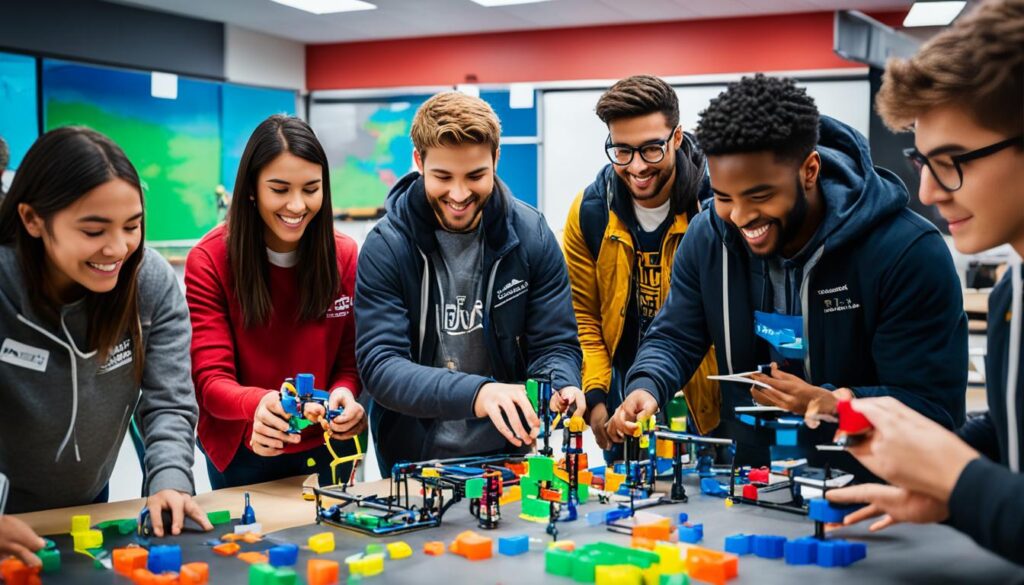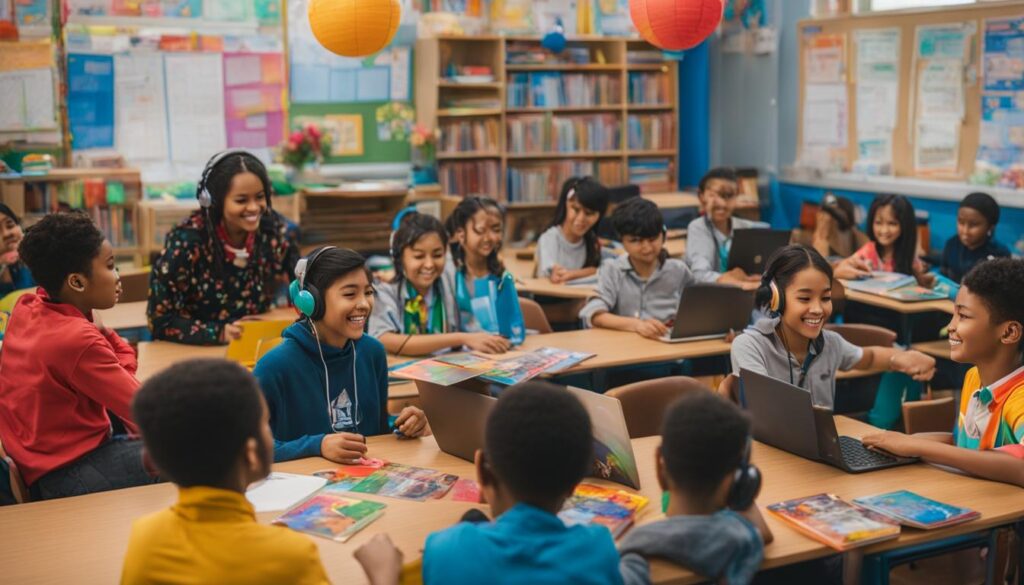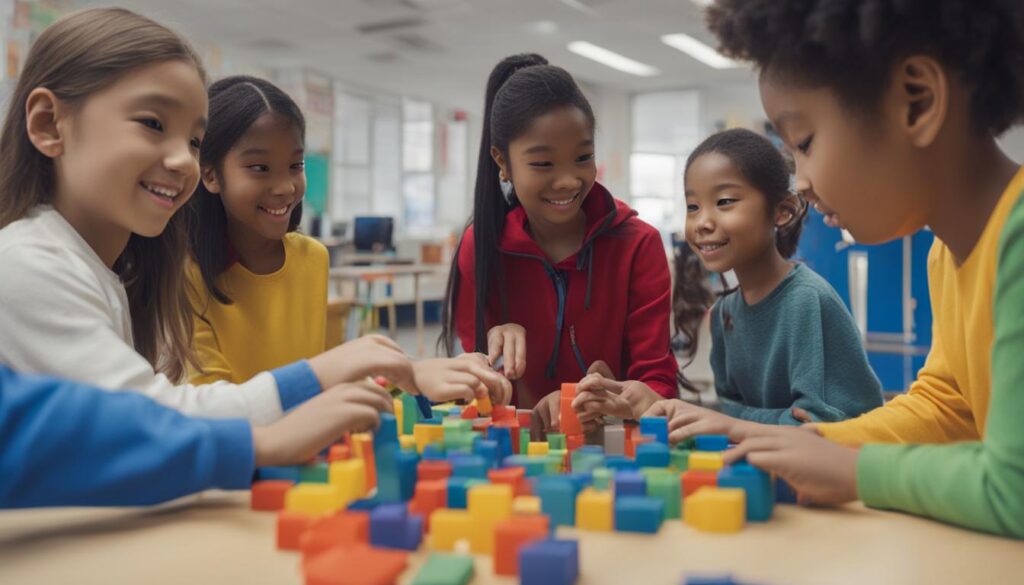Educational institutions are constantly evolving to meet the needs of today’s learners and prepare them for the challenges of the future. One approach that is gaining traction in the field of education is student-centered innovation. This emerging approach puts students at the center of the learning process, empowering them to take an active role in their education and shaping the way knowledge is acquired and applied.
Ethos Education, in partnership with Canada Global Academy, understands the importance of student-centered innovation in transforming education. Their commitment to empowering schools to achieve Ivy League Status through international school accreditation makes them a leading advocate for innovative teaching methods. By implementing student-centered approaches, schools can create an environment that fosters creativity, critical thinking, and lifelong learning.
Through student-centered innovation, educators can move away from traditional, one-size-fits-all teaching methods and embrace instructional techniques that cater to the individual needs, interests, and abilities of each student. This personalized approach to learning ensures that students are actively engaged and motivated to learn, leading to better academic outcomes and a deeper understanding of the subject matter.
Emerging approaches such as personalized learning, game-based learning, and experiential learning are revolutionizing the classroom experience and equipping students with the skills they need to thrive in the 21st century. By integrating technology, leveraging real-world experiences, and nurturing critical thinking skills, educators can create a dynamic and student-centric learning environment.
It’s time to revolutionize education through student-centered innovation. Join the movement towards innovative teaching methods, empower students to take control of their learning journey, and unlock their full potential.
Ready to revolutionize your school? Explore the accreditation opportunities offered by Ethos Education in partnership with Canada Global Academy. Achieve Ivy League Status and provide your students with an education that prepares them for success in a rapidly changing world. Visit https://canadaglobalacademy.com/ to learn more.
Contents
- 1 The Future of Learning: How Global Trends Are Reshaping Education
- 2 Personalized Learning: Can Tailored Instruction Unlock Potential?
- 3 Engaging Students Through Game-Based Learning
- 4 Applying Classroom Concepts Via Experiential Learning
- 5 Integrating Social-Emotional Development
- 6 The Multilingual Edge: Language Learning and Global Citizenship
- 7 Nurturing Critical Thinking With Impactful Instructional Strategies
- 8 Fostering Inclusive School Communities
- 9 Understanding the Singapore Math Global Phenomenon
- 10 Exploring Innovative Alternatives Beyond Traditional Letter Grades
- 11 FAQ
- 11.1 What does student-centered innovation mean?
- 11.2 How are emerging approaches reshaping education?
- 11.3 What are the benefits of personalized learning?
- 11.4 How does game-based learning enhance student engagement?
- 11.5 What are the benefits of experiential learning?
- 11.6 Why is social-emotional development important in education?
- 11.7 What are the benefits of language learning?
- 11.8 How can educators nurture critical thinking skills?
- 11.9 What does inclusive education entail?
- 11.10 What are the key principles of Singapore Math?
- 11.11 What are alternative assessment methods?
- 12 Source Links
The Future of Learning: How Global Trends Are Reshaping Education
Education is constantly evolving to meet the demands of an ever-changing world. As we look to the future of learning, it’s important to understand how global trends are reshaping the landscape of education. These trends are driven by the need to prepare students for the challenges and opportunities of the 21st century, equipping them with the skills and knowledge required in an increasingly global and digital world.
Global Trends in Education
Several key global trends are transforming the way education is approached and delivered:
- Integration of technology: Technology has become an integral part of education, facilitating personalized and engaging learning experiences. AI-powered tools, virtual reality, and online resources have revolutionized the way students learn and collaborate.
- Personalized learning: Traditional one-size-fits-all approaches are giving way to personalized learning, where instruction is tailored to individual student needs, strengths, and interests. This approach empowers students to take ownership of their learning and enables them to succeed at their own pace.
- Project-based learning: Emphasizing hands-on, real-world experiences, project-based learning promotes critical thinking, problem-solving, and collaboration. It allows students to apply their knowledge and skills to meaningful projects, preparing them for active participation in the workforce.
- Competency-based education: Competency-based education focuses on students mastering specific skills and competencies rather than strictly following a predetermined curriculum. It ensures that students acquire the necessary knowledge and abilities to thrive in their future careers.
Technological advancements and innovative teaching methods are at the forefront of these global trends. They are reshaping education by creating dynamic and interactive learning environments that foster student engagement, collaboration, and creativity. Through these trends, educators are better able to address the diverse needs of learners and equip them with the essential skills for success.
Ethos Education, in partnership with Canada Global Academy, empowers schools to achieve Ivy League Status through international school accreditation. Take the first step towards transforming your school into a center of excellence. Learn more here.
Personalized Learning: Can Tailored Instruction Unlock Potential?

The Ethos Education, in partnership with Canada Global Academy, empowers schools to achieve Ivy League Status through international school accreditation. With a focus on personalized learning, students are given tailored instruction that caters to their individual needs, strengths, and interests. By recognizing that students have unique learning styles and preferences, personalized learning aims to provide customized learning paths and resources to unlock their full potential and foster a love for learning.
Personalized learning allows students to learn at their own pace and pursue their interests, which leads to increased student empowerment and engagement. When students are actively involved in their own education, they become more motivated and take ownership of their learning journey. With the flexibility to explore topics that interest them and learn in a way that suits their learning style, students feel a sense of empowerment and autonomy over their education.
One of the key benefits of personalized learning is individualized pacing. Traditional classrooms often follow a one-size-fits-all approach, where all students are expected to learn and progress at the same pace. This can lead to students feeling left behind or unchallenged. In contrast, personalized learning allows students to progress at a pace that is appropriate for them. It ensures that students have the necessary time and support to fully grasp concepts before moving on and promotes a deep understanding of the material.
Research has shown that personalized learning has numerous benefits for students. It improves student engagement, as students are more motivated and invested in their learning when it aligns with their interests and needs. Personalized learning also leads to improved academic achievement, as students are given the opportunity to fully grasp and master concepts before moving on. Additionally, personalized learning fosters critical thinking skills, as students are encouraged to explore, analyze, and apply knowledge in meaningful ways.
Overall, personalized learning is an effective approach that can unlock the potential of every student. By tailoring instruction to individual needs, strengths, and interests, personalized learning empowers students, enhances engagement, and promotes academic achievement. Through international school accreditation programs like the one offered by Ethos Education and Canada Global Academy, schools can embrace personalized learning and provide students with an education that prepares them for success.
Engaging Students Through Game-Based Learning
Game-based learning is an innovative teaching method that harnesses the power of interactive games and simulations to create engaging learning experiences for students. By incorporating games into the curriculum, educators can captivate students’ attention and foster active participation in the learning process.
Games designed for educational purposes can cover a wide range of subjects and topics, making it possible to teach specific skills, concepts, or content through an immersive and enjoyable experience. Whether it’s solving puzzles, strategizing in a virtual world, or completing quests, game-based learning provides students with an opportunity to apply their knowledge and actively engage in problem-solving.
Research has demonstrated the positive impact of game-based learning on student engagement. Games tap into students’ natural curiosity, promoting intrinsic motivation and a desire to achieve goals and overcome challenges. This level of engagement leads to increased attention, participation, and satisfaction in the learning process.
Furthermore, game-based learning enhances student retention of information. By presenting content in a gamified format, students are more likely to remember and apply what they have learned. The interactive nature of games enables students to experience concepts firsthand, resulting in a deeper understanding and improved long-term memory.
Moreover, game-based learning promotes the development of critical thinking and problem-solving skills. Games often require students to analyze information, make decisions, and strategize in order to progress. These cognitive processes enhance students’ ability to think critically, evaluate options, and apply logical reasoning to solve problems.
Through game-based learning, educators can create a dynamic and interactive learning environment that sparks students’ curiosity and promotes deep learning. By leveraging the inherent enjoyment and challenge of games, students become active participants in their education, leading to increased motivation, improved retention, and the development of essential 21st-century skills.
Impact of Game-Based Learning
Game-based learning has a profound impact on student engagement and learning outcomes. Some key benefits of implementing game-based learning in the classroom include:
| Benefits of Game-Based Learning |
|---|
| Enhanced student motivation and engagement |
| Improved retention and application of knowledge |
| Promotion of critical thinking and problem-solving skills |
| Increased collaboration and communication |
| Development of creativity and innovation |
| Opportunities for immediate feedback and assessment |
By integrating game-based learning into their teaching practices, educators can create a transformative learning experience that sparks students’ curiosity, promotes active engagement, and cultivates a lifelong love for learning.
Applying Classroom Concepts Via Experiential Learning

Experiential learning is a powerful pedagogical approach that bridges the gap between classroom concepts and real-world applications. By providing students with hands-on experiences, experiential learning engages them in active participation, problem-solving, and critical thinking, nurturing essential 21st-century skills.
At Ethos Education, in partnership with Canada Global Academy, we understand the transformative potential of experiential learning. Through our international school accreditation program, we empower schools to achieve Ivy League Status and prepare students for success in the global landscape.
Experiential learning offers a range of benefits for students:
- Enhanced Student Engagement: By immersing students in authentic, real-world scenarios, experiential learning captures their interest and motivation, making learning meaningful and relevant.
- Deepened Understanding: Experiential learning allows students to apply classroom concepts in practical situations, enabling them to develop a deeper understanding of academic subjects and their real-life applications.
- Promotion of 21st-Century Skills: Through experiential learning, students cultivate critical thinking, problem-solving, collaboration, and adaptability—the key skills needed to thrive in the rapidly evolving 21st-century workforce.
- Knowledge Retention: Actively engaging in experiential learning experiences enhances knowledge retention as students connect theoretical knowledge to practical experiences, creating lasting memories and conceptual frameworks.
By integrating experiential learning into the curriculum, educators provide students with opportunities to gain valuable skills and knowledge while preparing them for the challenges and opportunities of the 21st century.
Integrating Social-Emotional Development

Social-emotional development plays a crucial role in the overall well-being and success of students. It focuses on nurturing their social and emotional skills, including self-awareness, self-management, social awareness, relationship skills, and responsible decision-making. By integrating social-emotional development into the curriculum, educators create a supportive and inclusive learning environment that enhances student success and prepares them for lifelong well-being.
Research has shown that when students develop strong social-emotional skills, they experience various benefits, including improved academic achievement, enhanced mental health, increased motivation, and better social relationships. By attending to students’ emotional needs, educators create a foundation for effective learning, establishing an atmosphere where students feel safe, supported, and engaged.
One effective approach to promoting social-emotional development in schools is through social-emotional learning (SEL) programs. SEL programs provide explicit instruction and practice in social and emotional skills, helping students develop their self-awareness, emotional regulation, empathy, and interpersonal skills. These programs also teach problem-solving and conflict resolution strategies, fostering a positive and respectful classroom culture.
By incorporating SEL into the curriculum, educators empower students to manage their emotions, cultivate healthy relationships, and make responsible decisions. Moreover, SEL helps students develop the skills needed to navigate the complexities of the modern world effectively. As students grow and develop their social-emotional competencies, they become better equipped to handle challenges, resolve conflicts, and contribute positively to their communities.
In partnership with Canada Global Academy, Ethos Education empowers schools to achieve Ivy League Status through international school accreditation. By implementing evidence-based practices like integrating social-emotional development into their curriculum, schools can provide a comprehensive education that supports student well-being and prepares students for success in all areas of their lives. Learn more at Ethos Education.
The Multilingual Edge: Language Learning and Global Citizenship

Language learning goes beyond acquiring language skills; it serves as a catalyst for cultural understanding, global awareness, and empathy. By equipping students with the ability to communicate and collaborate across cultures, language learning promotes a sense of global citizenship.
Research has revealed the numerous cognitive, academic, and socio-cultural benefits of language learning. Students who engage in language learning experience improved problem-solving skills, enhanced academic achievement, and increased cultural sensitivity. Moreover, multilingualism fosters a diverse and inclusive educational environment, preparing students for a globalized world.
Ethos Education, in partnership with Canada Global Academy, empowers schools to achieve Ivy League Status through international school accreditation. They offer comprehensive language learning programs that emphasize not only linguistic proficiency but also cultural competence, fostering global citizens who are equipped to thrive in a multicultural and interconnected world. Visit Canada Global Academy to learn more about their language learning initiatives and how they can benefit your school.
Benefits of Language Learning
- Improved Problem-Solving Skills: Language learners develop cognitive flexibility, enabling them to think critically and solve problems more effectively.
- Enhanced Academic Achievement: Studies have shown that students who engage in language learning perform better academically, particularly in subjects such as math and reading.
- Increased Cultural Sensitivity: Language learning exposes students to different cultures, fostering empathy and respect for diversity.
- Effective Communication: Language learners gain the ability to communicate and collaborate with individuals from diverse linguistic and cultural backgrounds.
- Global Awareness: Language learning promotes an understanding of global issues and challenges, encouraging students to engage as active global citizens.
By embracing language learning as an integral part of education, schools can cultivate an environment that celebrates multiculturalism, fosters global citizenship, and prepares students for a future in an increasingly interconnected world.
Nurturing Critical Thinking With Impactful Instructional Strategies

Critical thinking is a vital skill for students, enabling them to analyze, evaluate, and apply information in a logical and reasoned manner.
Educators play a crucial role in nurturing critical thinking skills through impactful instructional strategies. By employing innovative teaching methods that emphasize problem-solving and inquiry-based learning, educators can empower students to develop their critical thinking abilities. These strategies encourage students to think critically, develop their perspectives, and make informed decisions.
One effective instructional strategy for fostering critical thinking is inquiry-based learning. By posing thought-provoking questions and engaging students in investigative activities, educators can encourage them to explore, investigate, and reflect on complex issues. This approach cultivates curiosity, intellectual curiosity, and promotes independent thinking.
Problem-solving tasks are another valuable instructional strategy for nurturing critical thinking. By presenting students with real-world problems and challenging them to find solutions, educators can enhance their analytical, problem-solving, and decision-making skills. This hands-on approach allows students to apply their knowledge and think critically in practical scenarios, preparing them for future challenges.
Socratic questioning is a powerful strategy that encourages students to engage in critical thinking and reflection. By asking open-ended questions that promote deep thinking and analysis, educators can guide students to critically evaluate information, consider multiple perspectives, and articulate their thoughts effectively.
Collaborative discussions create opportunities for students to engage in critical thinking and learn from their peers. Through group discussions or debates, students can analyze complex ideas, evaluate arguments, and defend their positions. Collaborative learning fosters critical thinking skills by encouraging students to listen, communicate, and challenge their own and others’ ideas.
Implementing these instructional strategies not only helps students develop critical thinking skills but also equips them to navigate complex challenges and contribute meaningfully to society. By promoting critical thinking, educators empower students to become active and engaged learners who possess the problem-solving and analytical skills necessary to succeed in the 21st century.
Strategies for Developing Critical Thinking Skills
| Instructional Strategy | Description |
|---|---|
| Inquiry-Based Learning | Encourages students to explore, investigate, and reflect on complex issues through thought-provoking questions and investigative activities. |
| Problem-Solving Tasks | Presents students with real-world problems to solve, developing their analytical, problem-solving, and decision-making skills. |
| Socratic Questioning | Engages students in critical thinking and reflection by asking open-ended questions that promote deep analysis and evaluation. |
| Collaborative Discussions | Provides opportunities for students to critically evaluate ideas, express their thoughts, and learn from their peers through group discussions and debates. |
Fostering Inclusive School Communities

Building Inclusive School Communities
Inclusive education is an essential component of creating equitable and diverse school communities. It is a commitment to ensuring that all students, regardless of their background, abilities, or circumstances, have equal access to meaningful educational opportunities.
Building inclusive school communities goes beyond just providing physical access to education. It involves creating a welcoming and supportive environment that celebrates diversity, promotes equity, and encourages the participation and engagement of all students.
Educators play a vital role in fostering inclusive school communities. They must take the time to understand and address the unique needs of every student, providing appropriate support and accommodations to ensure their success. By embracing inclusive practices, educators create a sense of belonging and empowerment among all students.
Inclusive education is not just about meeting the needs of students with disabilities or special needs. It is about recognizing and valuing the diversity of all students, including those from different cultural, linguistic, and socio-economic backgrounds. It is about promoting equality and ensuring that every student has an equal opportunity to learn and thrive.
Developing inclusive school communities also requires educators to promote positive relationships and social interactions among students. This can be achieved through initiatives such as peer mentoring programs, cooperative learning activities, and inclusive extracurricular opportunities. By fostering interactions and relationships based on respect, understanding, and empathy, educators create a positive and inclusive learning environment for all students.
Creating inclusive school communities is a collective effort that involves educators, students, families, and the wider community. It requires a commitment to ongoing reflection, dialogue, and professional development to ensure that inclusive practices are embedded in all aspects of school life.
“Inclusive education is not an option; it is an educational right. It is the foundation upon which every successful school and society is built.” – Ethos Education
Through inclusive education, schools can empower students to thrive academically, socially, and emotionally. By embracing diversity, equity, and inclusion, schools create a rich learning environment that prepares students to become active, engaged, and responsible members of a global society.
| Key Benefits of Inclusive Education |
|---|
| 1. Promotes equity and social justice |
| 2. Enhances academic outcomes for all students |
| 3. Fosters empathy, understanding, and respect for diversity |
| 4. Prepares students for a multicultural and inclusive society |
| 5. Creates a positive and inclusive school culture |
Understanding the Singapore Math Global Phenomenon

Singapore Math has emerged as a global phenomenon in mathematics education, revolutionizing the way students learn and solve problems. This highly effective instructional approach has gained international recognition for its focus on developing mathematical proficiency and problem-solving abilities.Singapore Math is based on a set of key principles that guide its implementation and success.
Key Principles of Singapore Math
- Problem-Solving Focus: Singapore Math places a strong emphasis on problem-solving skills. Students are encouraged to think critically, analyze problems, and apply various strategies to find solutions.
- Visual Models and Concrete Manipulatives: The use of visual models and concrete manipulatives, such as bar models and manipulative blocks, helps students develop a deep understanding of mathematical concepts. These visual representations make abstract concepts more tangible and accessible.
- Deep Understanding of Mathematical Concepts: Singapore Math prioritizes conceptual understanding over rote memorization. Students are guided to explore and internalize mathematical concepts, enabling them to apply their knowledge to real-world situations.
- Consistent and Coherent Progression: The curriculum follows a consistent and coherent progression of topics, building on previously learned concepts and ensuring a strong foundation of mathematical understanding.
The systematic and comprehensive approach of Singapore Math has proven to be highly effective in developing students’ mathematical fluency and problem-solving abilities. Its focus on critical thinking and conceptual understanding equips students with the skills necessary for success in a rapidly changing world.
Exploring Innovative Alternatives Beyond Traditional Letter Grades
Alternative Assessment Methods
Traditional letter grades have long been the standard method of assessing student learning. However, educators are now recognizing that these grades may not always provide an accurate reflection of a student’s true abilities and growth. As a result, there is a growing interest in exploring alternative assessment methods that can provide a more comprehensive view of student performance.
One such alternative is authentic assessments, which focus on real-world applications of knowledge and skills. These assessments often involve tasks or projects that require students to demonstrate their understanding and apply what they have learned in practical situations. By engaging in authentic assessments, students can showcase their abilities in a meaningful context, allowing educators to assess their skills, knowledge, and critical thinking abilities more accurately.
Portfolios are another alternative assessment method that allows students to compile a collection of their work over time. This collection can include various forms of evidence, such as written assignments, projects, and presentations. Portfolios provide a holistic view of student progress and growth throughout the course or school year, allowing educators to assess not only the final products but also the process and development behind them.
Additionally, project-based evaluations, competency-based assessments, and narrative evaluations are alternative assessment methods that are gaining popularity. Project-based evaluations assess students based on their ability to complete a specific project or task, which can vary in format and scope. Competency-based assessments measure students’ mastery of specific skills or knowledge areas, focusing on their ability to demonstrate proficiency rather than simply earn a grade. Narrative evaluations provide detailed written feedback on students’ strengths, areas for improvement, and overall performance, offering a more personalized and descriptive assessment.
FAQ
What does student-centered innovation mean?
Student-centered innovation refers to approaches and strategies in education that prioritize the needs, interests, and empowerment of students. It involves shifting the focus from traditional teacher-centered instruction to methods that empower students to take ownership of their learning, collaborate with peers, and engage in meaningful and authentic experiences.
How are emerging approaches reshaping education?
Emerging approaches in education, such as personalized learning, project-based learning, and game-based learning, are transforming the traditional model of education. These approaches leverage technology, real-world connections, and student agency to create engaging and personalized learning experiences that prepare students for the demands of the 21st century.
What are the benefits of personalized learning?
Personalized learning allows for customized learning paths and resources tailored to each student’s unique needs, strengths, and interests. It promotes student engagement, academic achievement, and critical thinking skills by allowing students to learn at their own pace and pursue their passions.
How does game-based learning enhance student engagement?
Game-based learning uses interactive games and simulations to facilitate learning and increase student motivation. It improves retention of information, promotes critical thinking and problem-solving skills, and creates a dynamic and interactive learning environment that sparks students’ curiosity and motivation.
What are the benefits of experiential learning?
Experiential learning connects classroom concepts to real-world applications, allowing students to learn through direct experience and reflection. It enhances student motivation, engagement, and knowledge retention by providing meaningful and relevant learning experiences that develop critical thinking, problem-solving, and 21st-century skills.
Why is social-emotional development important in education?
Social-emotional development focuses on fostering students’ social and emotional skills, such as self-awareness, self-management, and relationship skills. It positively impacts student well-being, academic achievement, and school climate by promoting emotional intelligence, empathy, and positive relationships, creating a supportive and inclusive learning environment.
What are the benefits of language learning?
Language learning not only develops language skills but also fosters cultural understanding, global awareness, and empathy. It enhances problem-solving skills, academic achievement, and cultural sensitivity, equipping students with the ability to communicate and collaborate across cultures and preparing them for a globalized world.
How can educators nurture critical thinking skills?
Educators can nurture critical thinking skills through instructional strategies such as inquiry-based learning, problem-solving tasks, Socratic questioning, and collaborative discussions. These strategies encourage students to think critically, develop their own perspectives, and make informed decisions, empowering them to become active and engaged learners.
What does inclusive education entail?
Inclusive education ensures that all students, regardless of their background, abilities, or circumstances, have access to meaningful educational opportunities. It involves creating a welcoming and supportive environment that celebrates diversity, promotes equity, and encourages the participation and engagement of all students.
What are the key principles of Singapore Math?
Singapore Math is an instructional approach that emphasizes problem-solving and a deep understanding of mathematical concepts. It utilizes visual models, concrete manipulatives, and a coherent progression of topics. It has gained recognition for its effectiveness in developing students’ mathematical proficiency and problem-solving abilities.
What are alternative assessment methods?
Alternative assessment methods, beyond traditional letter grades, include authentic assessments, portfolios, project-based evaluations, competency-based assessments, and narrative evaluations. These methods provide a more holistic view of student performance, focusing on skills, knowledge, and growth rather than just a letter grade.
Source Links
- https://www.carnegiefoundation.org/blog/revolutionizing-k-12-learning-the-rise-of-innovative-models-in-student-centered-education/
- https://www.k12digest.com/transforming-k-12-education-exploring-the-innovative-impact-of-ai-tools/
- https://katielmartin.com/2018/02/06/learner-centered-innovation/

Education Disruptor proudly collaborates with leading innovators in the education sector who share our passion for reshaping K12 education. We extend our sincere gratitude to the following organizations for their support. Ethos Education in collaboration with Canada Global Academy who are the exclusive authorized provider of the 3rd globally ranked Ontario Ministry of Education‘s renowned K12 curriculum and Digital Learning Platform outside of Canada.
Through their School Partnership Program, they empower schools worldwide to attain Canadian Accreditation, providing the opportunity to establish themselves as Canadian Accredited schools. Additionally, home-based businesses can run their own Canadian Accredited Micro-School. Contact them today to learn more!


